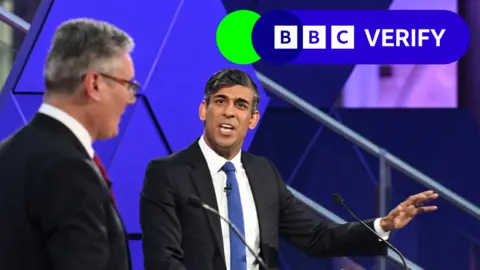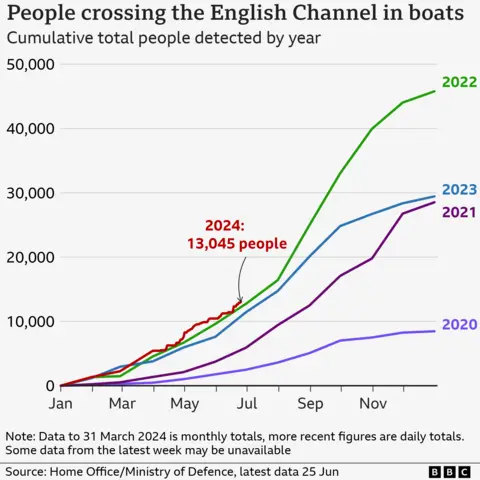Through check employees, bbc information
 getty pictures
getty picturesRishi Sunak and Keir Starmer have taken questions from the BBC’s target audience in their final head-to-head debate ahead of the vote.
He dealt with claims on immigration, tax and web 0 insurance policies. BBC Check has been investigating his claims.
Will Labor introduce tax relief?
rishi sunak “State pensions will be subject to superannuation tax” as mentioned below the sometime Labor Executive.
Pensioners relying only on the surrounding pension are undoubtedly on track to pay a smaller amount of source revenue tax in 2027-28, as the surrounding pension (£12,578) will become tax-free non-taxable in that time. It is estimated to be slightly more than. -Public Allowance (£12,570).
The Conservative triple lock plus coverage – which increases the personal allowance for pensioners to £13,710 by 2027-28 – would take away that opportunity.
Labor has not said whether he will fit in. Consider, however, the Conservatives only unveiled the policy in the last few weeks, so deliberately presenting it as a Labor tax increase is a bit disingenuous.
And remember that the Conservatives’ Triple Lock Plus will save anyone living on a pension only around £29 per time.
Furthermore, some members of the public are already paying tax on a portion of their pensions.
Research by former Lib Dem pensions minister Steve Webb, who works for an actuarial company, also shows that around 2.5 million pensioners (one in five total) are currently paying source income tax on their pensions. Have and still will even if Triple Lock Plus is introduced.
This is because many people receive additional pension bills due to participation in the Environmental Income Equalization Pension Scheme (SERPS).
via Ben Chu
Have 50,000 people crossed the Channel under Sunak?
keir starmer Noted: “Since Rishi Sunak became Prime Minister, 50,000 people have arrived in small boats.”
He is right about this.
House Administrative Center publishes statistics – Going again in 2018 – Crossing the English Channel in mini boats revealed to the public. The exact number revealed since Rishi Sunak became Prime Minister on 25 October 2022 is 50,108.
The highest figure recorded at one time was in 2022, when 45,755 came this way.
At the peak, 29,437 people were found arriving in mini boats – a third of the number reported unwell at that time.
Within the last 12 calendar months, 31,204 people were found crossing, up 30% from the previous 365 days.
Alternatively, this time 13,045 have been detected so far, which is about 16% more than the closing time of the same period and a record.
via Anthony Reuben

Will Labour’s Web 0 plans be worth billions?
rishi sunak Mentioned: “We’ve just got a recording that he’s put out there of him admitting to the Labor Party Deputy Chancellor that his plans will cost hundreds of billions of pounds.”
The Prime Minister was referring to a Daily Telegraph story Regarding Shadow Chief Secretary to the Treasury Darren Jones, who was quoted as saying that Labour’s net zero plans would cost “hundreds of billions” of pounds.
But this figure is consistent current estimate To reach net zero greenhouse gas emissions by 2050, which is also enshrined in law and Conservative policy.
UK’s independent Office for Budget Responsibility (OBR) Reported back in 2021 Reaching net zero by 2050 will require approximately £1.3 trillion of investment.
But the OBR also said it would save around £1 trillion by moving away from fossil fuels – meaning much lower net costs.
The bulk of the investment costs are expected to be met by the private sector rather than direct government spending. In the audio clip published by the Telegraph, Jones did not mention direct government spending.
by mark poynting
Is Labour’s manifesto fully funded and based on cost?
keir starmer Labour’s manifesto is referred to as “fully funded, fully costed”.
But in its analysis of the manifestos earlier in the week, the independent think tank the Institute for Fiscal Studies (IFS) said it was skeptical of claims that they were fully funded, particularly on promises to reduce NHS waiting times.
“You can’t make a pledge to eliminate all waits over 18 weeks, allocate no funding to that pledge, and then claim the full cost declaration,” said Paul Johnson, director of the IFS.
He also said that the Conservatives’ commitments to the NHS “are not necessarily funded”.
via Anthony Reuben
Will Labor raise tax up to £2,000 per household?
rishi sunak Asked “Could you afford to pay at least £2,000 more in tax?”, claiming that this is what a Labor government would ask people to do.
This figure risks misleading people, not least because it includes an extra £500 a year for four years. If someone said your taxes were going up by £2,000 you wouldn’t normally think so.
The Tories arrived at this figure by adding up what they claimed Labour’s spending plans would cost – £38.5 billion over four years – and dividing it by the number of UK households with at least one person working. Labor disputes the figures.
Conservatives say the costs were decided by impartial civil servants, but are based on assumptions made by some politically appointed special advisers.
For example, one cost looks at Labor’s plan to have more services provided by the state rather than private companies and assumes that private companies are always 7.5% more efficient. But civil servants who determine the costs warned about the use of that figure. Read more Here,
via Anthony Reuben
Are people still paying the price of Liz Truss’s unearned tax cuts?
keir starmer Said the Conservatives were planning “unfunded tax cuts”, saying former Prime Minister Liz Truss had tried that experiment. He said “people are still paying the price” and they were paying “hundreds of pounds more because of the damage done to the economy”.
It is true that mortgage rates did rise after the mini-budget – which included tax cuts unrealized during Truss’s short-lived premiership.
But mortgage rates were rising before the mini-budget, as the Bank of England raised interest rates to fight inflation, which began rising after the pandemic and war in Ukraine. The spike ended in early 2023.
The Governor of the Bank of England said last January that the impact of the mini-budget on interest rates had been “largely washed out”.
But anyone who took out a fixed-rate mortgage soon after may have signed up for a higher interest rate than they otherwise would have.
by ben king


Discover more from news2source
Subscribe to get the latest posts sent to your email.





